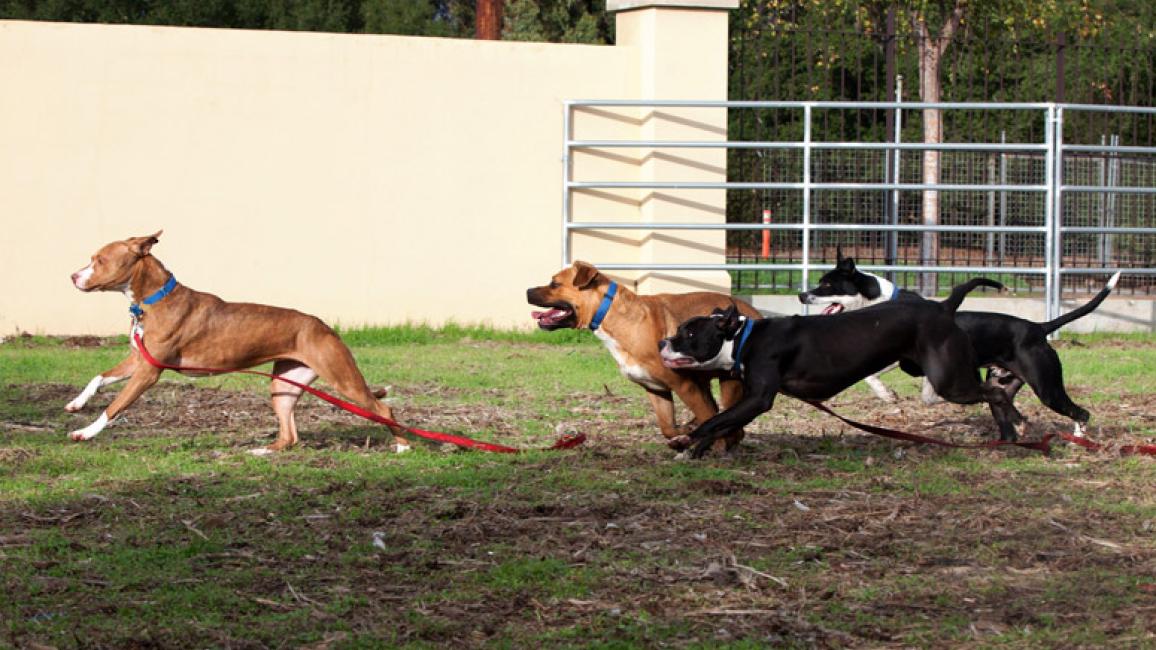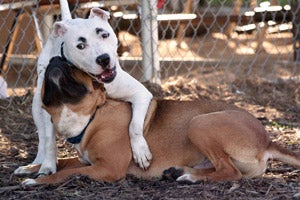Dog playgroups increase adoptablity of shelter dogs

A training and behavior program for dogs in shelters featuring playgroups - "Playing for Life!" - gets high praise for its effectiveness. The program, presented by esteemed dog trainer Aimee Sadler, works on two levels. It helps shelter dogs and the staff who works with them by providing socialization while they release their pent-up energy, and it allows the staff to learn useful information about their charges, which can only be helpful towards the end goal, getting dogs placed into their forever homes.
Given its track record - Aimee has presented the workshop in over 40 shelters around the country - it only makes sense that Mike Harmon, adoption manager at the Best Friends Pet Adoption and Spay/Neuter Center, would reach out to her to bring the lifesaving endeavor to Los Angeles and share it with NKLA, the Best Friends initiative to realize a No-Kill Los Angeles.
Continuing education for animal staff
 "We reached out to Aimee to present 'Playing for Life!' to our staff, volunteers, and rescue colleagues because we are always looking at new ways to increase enrichment for our dogs and new ways to help them become more adoptable," shares Mike. "Playgroups give the dogs the ability to become more socialized and exercise while the staff and volunteers learn more about their personalities and behavior. We invited our volunteers, along with folks from local shelters. We were so pleased that we had folks from all over the Los Angeles rescue community, including representatives from Los Angeles Animal Services, Irvine Animal Care Center, and Department of Animal Care and Control in Agoura come and take advantage of this lifesaving opportunity."
"We reached out to Aimee to present 'Playing for Life!' to our staff, volunteers, and rescue colleagues because we are always looking at new ways to increase enrichment for our dogs and new ways to help them become more adoptable," shares Mike. "Playgroups give the dogs the ability to become more socialized and exercise while the staff and volunteers learn more about their personalities and behavior. We invited our volunteers, along with folks from local shelters. We were so pleased that we had folks from all over the Los Angeles rescue community, including representatives from Los Angeles Animal Services, Irvine Animal Care Center, and Department of Animal Care and Control in Agoura come and take advantage of this lifesaving opportunity."
Mike says that playgroups will be incorporated into the center's routine, beginning with five days a week and then increasing to seven days a week as staff and volunteers gain more experience. "All dogs are eligible for playgroups, and we have between 170 and 250 dogs in our care at any time, so this is going to have a huge impact on how we are better able to give the dogs what they need but still stay within the constraints of our staffing resources."
Dog volunteers
One of the volunteers who joined the workshop is longtime Los Angeles resident Audrey Brooks. A member of the Best Friends extended family since 1989, Audrey was happy when she was ready to retire that the Best Friends Pet Adoption and Spay/Neuter Center gave her a local facility to volunteer at. She wanted to spend her time at a shelter with an upbeat environment, and she found that, and more, at the center.
"Because I love animals, and now I have more spare time, I love volunteering at the center. One of the most rewarding aspects of volunteering is working with the dogs," enthuses Audrey.
She's been instrumental in helping realize recent adoptions of two dogs she took through traditional training sessions - Buck and Arrow. She sees the playgroups as expanding on that one-on-one training to enable more dogs to gain confidence, be calmer in their kennels when potential adopters come through, and, ultimately, find homes faster.
"I have been taking my latest training dog, Marty, through the sessions, and I can see him incrementally improving. But after a playgroup, his demeanor is totally different; he's so much calmer. I can see how playgroups make a difference right away."
Audrey is ecstatic over the strides being made in Los Angeles, from the pet sale ban to the NKLA coalition working together. She shares, "It makes me feel like we can make Los Angeles no-kill."
Extraordinary results of dog playgroups
The leap to playgroups was a natural one for Aimee. A few years ago, she was asked to work with the dogs at Southampton Animal Shelter Foundation. It is an open-admission facility that has rows of kennels facing each other. She decided to help the dogs get their ya-ya's out before beginning the formal training sessions by taking them out in groups to play first. What she discovered opened the door to extreme lifesaving. The shelter went from a 70-something percent save rate to an around 95 percent save rate.
"Playgroups really help high-volume shelters, and Best Friends' L.A. center is in a unique position to help a vast majority of dogs," says Aimee. "We've all seen it. Some dogs can deteriorate in a kennel environment quickly. Their behavior becomes more and more challenging. People can misinterpret the dogs' frustration as aggression, so their needs are not addressed. Playgroups enable dogs to work off their energy, learn from each other to build better social skills, while providing a discovery tool for the staff and volunteers."
Aimee is thrilled that the playgroups can help NKLA reach its goal. "What Best Friends is doing in Los Angeles is changing the industry, and I'm very excited to be able to support the work and help achieve greater results."
Get involved to help animals
You can volunteer, adopt and donate towards a No-Kill Los Angeles.
Photos by Nick Carranza